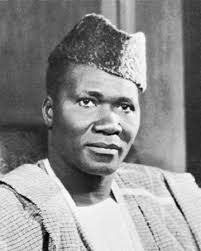SEKOU TOURE: ON CULTURE
“The imperialists use scientific, technical, economic, literary and moral cultural values in order to maintain their regime of exploitation and oppression. The oppressed peoples equally use cultural values of a contrary nature to the former, in order to make a better fight against imperialism and to extricate themselves from the colonial system. If scientific knowledge, modern techniques and the elevation of thought to the level of higher human principles for the perfecting of social life, are necessary for the enrichment of a culture, they none the less retain the capacity of being used for contradictory purposes.
It is at this point that the cultural value of a people must be identified with the contributory value which it may represent in the development of universal civilization in establishing between human beings concrete relations of equality, solidarity, unity and fraternity.
Thus, the true political leaders of Africa, whose thought and attitude tend towards the national liberation of their peoples can only be committed men, fundamentally committed against all the forms and forces of depersonalization of African culture. They represent, by the anti-colonialist nature and the national content of their struggle, the cultural values of their society mobilized against colonization.
It is as representatives of these cultural values that they lead the struggle for the decolonization of all the structures of their country.
But decolonization does not consist merely in liberating oneself from the presence of the colonizers: it must necessarily be completed by total liberation from the spirit of the ‘colonized’, that is to say, from all the evil consequences, moral, intellectual and cultural, of the colonial system.
Colonization, in order to enjoy a certain security, always needs to create and maintain a psychological climate favourable to its justification: hence the negation of the cultural, moral and intellectual values of the subjected people; that is why the struggle for national liberation is only complete when, once disengaged from the colonial apparatus, the country becomes conscious of the negative values deliberately injected into its life, thought and traditions… in order to extirpate them in the conditions of its evolution and flourishing. This science of depersonalizing the colonized people is sometimes so subtle in its methods that it progressively succeeds in falsifying our natural psychic behaviour and devaluing our own original virtues and qualities with a view to our assimilation It is no mere chance that French colonialism reached its height at the period of the famous and now exploded theory of ‘primitive’ and ‘pre-logical mentality’ of Lévy-Bruhl. In modifying certain forms of its manifestations, although it apparently tries to adapt itself to the inevitable evolution of the oppressed peoples, colonization has never engendered, under the most diverse and subtle aspects, anything but a moral, intellectual and cultural superiority complex towards the colonized peoples. And this policy of depersonalization is all the more successful since the nature of the degree of evolution of the colonized and colonizer is different. It is all the more deeply rooted where domination is long-lasting.
In the most varied forms, the ‘colonized complex’ taints evolution and imprints itself on our very reflexes. Thus the wearing of a cap and sun-glasses, regarded as a sign of western civilization, bears witness to this depersonalization which runs counter to the current of our evolution.
Nevertheless, it is wrong to think that one people, one race, one culture possess by themselves all the moral, spiritual, social or intellectual values: to believe that the truth is not necessarily to be found elsewhere than in one’s own national, racial or cultural background is an Utopia.
We have already said that human discoveries, intellectual acquisitions, the expansion of knowledge do not belong exclusively to anyone. They are the result of a sum of universal discoveries, acquisitions and expansion in which no people has the right to claim a monopoly.
The immigrants into the United States did not leave behind them at the frontiers of their respective countries all that they acquired in the intellectual field; they did not have to reinvent sailing ships, iron tools or gunpowder. They used them for their own needs before certain colonial powers thought of claiming their discovery and the rights of ownership in them.”
Context: On October 2, 1958 Sekou Touré, proclaimed Guinea’s independence from France and became its first president. One year later he gave a speech in Conakry, the capital in which he outlined the role of political leaders in reflecting and developing the culture of their nations. The above is an extract from that speech.




